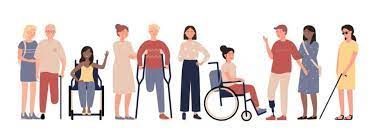Cost & Lack of Adequate Insurance Coverage
Cost and inadequate insurance coverage are probably the biggest reasons why people miss out on mental health coverage in the U.S. Most insurance providers only cover a very small number of therapy sessions if they cover anything at all, and like other medical expenses, therapy can be costly. For individuals with disabilities, other medical costs can add up, leading to even less funding for psychological support.
Lack of Appropriate Accessibility Accommodations & Discrimination
Ableism is apparent everywhere, and unfortunately, therapy practices are not immune from this form of discrimination. This can be as obvious as not having physical accessibility options for those with assistive walking devices or wheelchairs, or it can be less noticeable from the outside. For instance, not having adequate space for a wheelchair in therapy rooms or having seating that’s difficult to get in and out of. Narrow hallways, receptions desks that are too tall, not having automatic doors. Not to mention loud distracting noises, crowded waiting areas, poor lighting, and other issues that can impact neurodiverse clients. Accessibility failings are plentiful at therapy offices, and in the practice of therapy itself. Some therapists aren’t equipped to understand the way that disabilities effect a person’s ability to engage in certain therapy practices. It’s important to work with therapists who have the knowledge and expertise to make appropriate accommodations and avoid discriminatory practices. No one is perfect, but every attempt should be made to ensure you are treated with respect and receive care that is comparable to that provided to those who are considered typically able.
Lack of Providers who Are Knowledgeable About the Mental Health Impact of Disabilities
That brings us to another serious issues within mental health. There just aren’t enough therapist who have the necessary training, education, and experience to offer truly inclusive care to people of all abilities. This puts much of the onus of receiving appropriate treatment on the person with disabilities. They need to ask for accommodations and the bare minimum standards to ensure comparable care.
Self-Advocacy Tips for People with Disabilities
One of the first and most important things people with disabilities can do to ensure they receive necessary and appropriate mental health care is to find a therapist who specializes in working with people with disabilities. This can ensure a more seamless process. You are the expert on you, so they may have questions about your needs, but they will typically be aware of possible solutions and able to provide you the best possible support and resources. Additionally, there are some self-advocacy steps that can be taken to further improve the therapy process, including:
- Be clear about your needs and goals – during your initial therapy session, talk to your therapist about your expectations of them and of therapy. Ask them honestly if they feel they can accommodate your needs. If the answer is no, ask them for a reference to a therapist who will be able to. Accommodations may include physical needs, coordination with other healthcare providers, changes in therapy delivery approach, and differences in how therapy resources are utilized outside the office.
- Know your rights – review the Americans with Disabilities Act (ADA) to ensure you understand the protections against mental health discrimination that are afforded to you by law. Some illegal actions that can be taken by therapy practices include charging more money for providing accessibility accommodations and refusing to provide you with service.
- Create your support network – talk to friends, families, case workers, and others who provide support for you about your therapy goals and experiences. Often, we get used to being mistreated or poorly treated, and it’s difficult to see when things are wrong or have the confidence to speak up for ourselves. When we share with our support network, it gives us the courage to speak our mind and ask for what we deserve, knowing they are behind us
Schedule a Session with A Therapist Who Gets It
If you are looking for a therapist in Livonia, MI who understands and advocates for the needs of people with disabilities, we hope you’ll consider working with us at Lotus Psychology Group. When you’re ready to get started, call us at (248) 957-8973, email mailto:info@lotuspsychgroup.com, or complete our online contact form.

